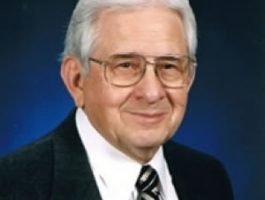
Survival in the South Pacific
Like many young men in the 1940's, Ed Harrell proudly joined the Marines to fight for his country. Little did he know that he would soon be fighting for his life, as he and the crew of the USS Indianapolis struggled to stay alive after a Japanese torpedo tore through their ship. Hear about their grueling days at sea by joining us today for the broadcast.
Show Notes
About the Host
About the Guest
-
Like many young men in the 1940's, Ed Harrell proudly joined the Marines to fight for his country. Little did he know that he would soon be fighting for his life, as he and the crew of the USS Indianapolis struggled to stay alive after a Japanese torpedo tore through their ship. Hear about their grueling days at sea by joining us today for the broadcast.
-
Dave and Ann Wilson
Dave and Ann Wilson are hosts of FamilyLife Today®, FamilyLife’s nationally-syndicated radio program. Dave and Ann have been married for more than 38 years and have spent the last 33 teaching and mentoring couples and parents across the country. They have been featured speakers at FamilyLife’s Weekend to Remember® marriage getaway since 1993 and have also hosted their own marriage conferences across the country. Cofounders of Kensington Church—a national, multicampus church that hosts more than 14,000 visitors every weekend—the Wilsons are the creative force behind DVD teaching series Rock Your Marriage and The Survival Guide To Parenting, as well as authors of the recently released book Vertical Marriage (Zondervan, 2019). Dave is a graduate of the International School of Theology, where he received a Master of Divinity degree. A Ball State University Hall of Fame quarterback, Dave served the Detroit Lions as chaplain for 33 years. Ann attended the University of Kentucky. She has been active alongside Dave in ministry as a speaker, writer, small-group leader, and mentor to countless wives of professional athletes. The Wilsons live in the Detroit area. They have three grown sons, CJ, Austin, and Cody, three daughters-in-law, and a growing number of grandchildren.
-

Ed Harrell
Edgar Harrell owned and operated the Pella Window Company, Inc., Rock Island, Illinois for thirty-five years until his retirement in 1985. During the years 1970 to 1985, he served on the board of trustees of the Moody Bible Institute, in Chicago, Illinois, and has been a popular Bible teacher and lay minister throughout his adult life. He has enjoyed many years of fishing and big game hunting in the Rocky Mountains from Alaska to New Mexico, and currently resides in Clarksville, Tennessee with h...more
Like many young men in the 1940’s, Ed Harrell proudly joined the Marines to fight for his country.
Bob: Sixty-five years ago this month, Ed Harrell was one of a few hundred men floating in the Pacific following the sinking of the USS Indianapolis. In the four days that he was afloat, Ed saw some of his fellow sailors drift away from the group ultimately to be eaten by sharks. Some who thought they saw an imaginary island and tried to swim away never came back. For Ed, those memories are vivid.
Ed: I can see it today. I think maybe I'd like to look at it and say that the Lord reminds me even today, of those incidents, and as He reminds me of those, then they help to strengthen my faith and my resolve to live a life for Him today.
Bob: This is FamilyLife Today for Thursday July 8th. Our host is the President of FamilyLife, Dennis Rainey, and I'm Bob Lepine. Where did Ed Harrell's hope come from when it appeared all reason for hope was gone?
And welcome to FamilyLife Today, thanks for joining us. You know, we've heard a story this week Dennis, about a ship under attack. I had to think about the movies I’ve seen where you watch the Titanic go down, and the trauma, the horror of an event like that. And then we’ve heard about the ongoing horror and terror of living in the middle of the ocean, bundled up with your buddies, hooked with your lifejackets to one another as the sharks encircle you in the waters and wondering, "Does anyone even know we're out here or will we die at sea?"
No food, no fresh water except for a thundercloud that comes by and gives you a little bit of a rain shower. You hear a story like this, and you wonder where does the will to survive in the midst of that come from? I think of myself and think, "When would I just lay my head back and say, "Okay, I'm ready to die. I'd rather do that than keep living like this."
Dennis: Yes, in fact, there's a story that Ed Harrell, who joins us again on FamilyLife Today. Ed, welcome back to the broadcast.
Ed: Thank you.
Dennis: There's a story you tell, Ed, of a Marine buddy who was ready to do the very thing Bob was talking about. He was ready to quit, and the picture I had from reading your book was you kind of grabbed him by the life jacket and looked him in the eyes, and you gave him a reason to believe.
Ed: I pretty much gave him an ultimatum, really, in that he had tried to convince me that he was going to commit suicide. He'd gone into the water head first and all of that oil in his eyes and then, you can imagine–you take your hand, and you try to rub that oil out, but the more you rub your eye, you're rubbing salt in, and you're kind of taking that salt that's in the water, you're grinding your eyeballs with that. And then the sun then, beaming off of that water, then through the daytime. By the second day, Spooner was determined that he was going to commit suicide, and he mentioned that two or three times.
Finally, I realized that he’s not just talking, he really means that. I asked him, I said, “Spooner, how are you going to do that?” He said, “Harrell, I’m going to dive down so far I’ll drown before I come back up.” He’d repeated that enough that I knew—finally he was at the point that I was convinced that he really meant business.
Dennis: What day was it at that point?
Ed: That was some time, the afternoon of the second day, the evening of the second day.
Dennis: So your tongues at that point were swelling in your mouths from dehydration, there were sharks in the water around you. It was, from all physical standpoints, a hopeless situation.
Ed: It nearly was. Anyway, I recall that I just got a hold of Spooner, and I turned him to me, and I kind of looked him squarely in the eye, and I said, "Spooner, there's only two of we Marines out here, and whenever a sailor is gone, there's still going to be two Marines, and you're going to be one of them with me."
I kind of turned him to me, and I fashioned—hooked his lifejacket then onto mine, and I swam with him then through that night, and then. Really I think, honestly by the next morning—you know sometimes when you get a cut or something it hurts worse the first day or two, but after a day or two, it begins to subside a little bit. I don’t think his eyes were bothering him as much maybe the third day.
It was sometime then the third morning that he wanted me to release him, and he made a vow to me that he would fight for life as long as there was breath in him because of him being able to survive as long as he had through that night, and I released him, then, the next day. Now, in releasing him, we didn’t go our separate ways, we were still buddies together all the way through.
In fact, any time at night—we were shivering at night. In day time you burn up, but at night, Spooner would take his legs, and put them around my legs, and put them in the pit of my tummy, and mine around his legs, and hang them behind his kidneys. Then I tore off the sleeves off my dungaree jackets and I spread it over my face so I could lie back in the kapok jacket and keep any water from sloshing in my face and causing me to get strangled and be forced to drink some of the salt water.
So, we had the body warmth from each other and then we too, we had our dungaree trousers and jackets on. They were a big help, in that they helped to keep the body temperature, body heat that you normally would have in the body, it helps to contain that. Rather than if you have no clothing on, then that 85 degree temperature then, your body is going to succumb to that. At 85 degrees, you get hypothermia.
Bob: You and some 300 of your shipmates survived in the waters in the Pacific from the time that your boat was attacked just after midnight on the 30th of July in 1945 when the Indianapolis went under in about 15 minutes. You survived for a period of, what was it, four days, five days?
Ed: It was four-and-a-half days, yes. We were sunk at five minutes after midnight, and it was after another four complete days, nearly at nightfall that I actually was rescued. So it was four-and-a-half days. I haven’t counted the hours. But, four-and-a-half days, yes.
Bob: And you survived that, as you've already shared with us this week, there was—was it just a single rain shower that passed over that gave you a little bit of water?
Ed: Right, that's all the rain that we had the whole time I was out there, that's right.
Bob: So you're in salt water, you had a few tablespoons of fresh water in a four-and-a-half day period. Any food?
Ed: Well, let's come to the next day. The third day, when there were 17 of us, and we had literally had a prayer meeting. I mean, nearly everybody prayed.
Bob: You'd started with 80, and now you're down to 17.
Ed: Right.
Dennis: The sharks had picked off that many?
Ed: That's right–well, sharks and–you mentioned somebody giving up. I saw any number of boys that maybe at one minute you'd think, "Well, they're still alive," and just a little bit later you'd see that they just all of a sudden–seemingly, they just allowed their head to drop into the water, and they didn't have the energy to raise up, and they didn't care. You nearly get to the point where what’s the use? That was the case with Spooner.
I recall that third day that we had had a prayer meeting and everyone nearly was praying, and some would ask that you would pray for them—some had some children back home that they had never seen, and so on.
Anyway, we'd had a prayer meeting, and we got through with a prayer meeting there on that third day. I have the watch that I was wearing then. It’s not on today, but I have that watch. And, it was about one o’clock. We’d just had our prayer meeting, then we came upon this swell, and we looked off to a distance, and we could see that there looked like a little makeshift of a raft that was coming into our group.
And after a period of time, we yelled at them and they back at us, and it wasn't long until they made it into our group. There were five sailors, and they had a makeshift of a raft consisting of, two 40-millimeter ammunition cans and three crates, like, a wooden slatted potato crate or an orange crate. And as they came into our group, I recognized that there was no one on that raft, but there were lifejackets that they had taken off of boys that had already expired, and they had squeezed those out the best that they could, because a kapok jacket will last, maybe, 48 hours, but we've already long passed that.
So when they came in our group, they said that they were swimming to the Philippines; that if we could get close enough to the Philippines that maybe someone would see us. At that time, we were nearly convinced that no word had gotten out, and yet 50 years later we found out that it did. But, anyway, they wanted to know if anyone wanted to join them–swim to the Philippines, pushing that little raft.
Bob: That was hundreds of miles away, right?
Ed: Probably 500 miles. We didn't know that. So I looked at my buddy, Spooner, and I said, "Spooner, I'm going to go. I'm going to join them," and he said, "Harrell, if you go, I'm going to go," and so here are two Marines and five sailors began to say goodbye to our 15 other sailors, and we're going to swim to the Philippines, we thought. So here we start.
Dennis: Was there anything said by the guys you left? Did they say, "That's foolish to do that?
Ed: They did. They thought it was foolish. They said the sharks will get you, and, well, they've already gotten the bigger part of us, and there seemingly was no advantage to just stay and somewhat hope against hope and do what we can.
Dennis: So you swam out past the perimeter where those sharks had been circling that group of boys?
Ed: We left our group and actually, I recall that after we had gone a distance we could see the sun setting in the west, and we thought, "Well, we'll be able to see the moon, we'll be able to see the Southern Cross. We'll be able to see the sun now as it sets and we can tell that we're going to the Philippines. The Philippines are big enough that we're bound to get in close enough that someone will see us."
Well, after we had gone a good distance, we came upon a swell, and I could look off into at a distance. I saw some debris out at the starboard side out maybe a couple of hundred yards or so, and a 100 yards ahead of us. I called it to the attention of the others. We watched it for a good while. At first we thought, "Well, it's one of our buddies out there," but then as we got closer, we could tell that it was debris of some kind, not one of ours, and so you pray for food. What's the possibility could there be food out there and so we prayed.
I know I said, "I tell you what, if you'll keep going straight, I'm going to swim out and get that. If it's just a crate then we'll bring it in and fasten it onto our others here but let's hope and pray that it could be food."
Well, they thought I was foolish again, because the sharks maybe would get a straggler out there, but, really, I felt a real compelling force that says, "Go for it. Go and see what it might be." I know, as I swam and got closer and closer to that crate, I'm praying for food, I'm praying for water, anything.
As I got close enough that I could see those potatoes in that crate. Kind of in desperation, I didn't pause to thank the Lord for what I'm about to eat but, in desperation, I'm making my way to those potatoes, and I reached in to get that first potato. Then, as I got a hold of that first potato, kind of in the agony of defeat, all that rotten potato began to squeeze through my fingers, and as I kind of squeezed that in despair then, all of a sudden, it was solid potato on the inside.
I often say, “You know what a rotten potato smells like? Well, I know what they taste like.” To take that potato then and to peel it with my hands and my teeth, and eat part rotten potato, and part solid potato. That was some food that I needed, some starch, and some water in that.
Then I began to peel some of them, then, and fill my dungaree pockets full, and then I began to make my way back, then, to my buddies, with still a lot of potatoes in the crate. They could see that here I’m swimming with an arm on that crate and eating something and swimming. They hollered out, “What is it?” I said, “Rotten potatoes.” They left the life raft and they joined me out there. We had a feast. Oftentimes, I talk to young people, I say, “You know, we had a picnic and no ants to bother us.”
Dennis: You had sharks, though.
Ed: We had sharks, we had sharks.
Dennis: You describe in your book that on more than one occasion, the sharks would be circling, and you would look up, and there would be a dorsal fin headed straight toward you.
Ed: Right. I know, many times, I had a fin coming straight toward me. I knew that I was looking into eternity the next second, and yet as he got to me, he just went under, and I felt the dorsal fin as it hit me, and then him to go by. And maybe then–momentarily then–another one would come through and take a buddy next to you, and yet the Lord spared me. You have to be so mindful of all that the Lord does for you through your life and especially on occasions like that.
Bob: Did you ever lose hope? Day four–fourth night you've been through, did you ever think, "We're not going to make it. We're going to die out here."?
Ed: Oh, I'm sure I thought that many times. I wondered how much longer can a body really endure?. I lost about 27 pounds there in those four days and how much more can you endure?
Dennis: Hold it – 27 pounds. Is that fluid? How do you lose 27 pounds in four days?
Ed: I don't know. I just know that when I got to where I could weigh at the hospital in Guam, at one point I’d weighed, 180 something, and I’m down in the low 160 something. I forget the exact figure. But I’d lost 27 pounds. There are others that say that they lost 30 or 40 pounds.
But, you know, dehydration does that to you and then, of course, you might think that we aren't swimming all the time, but basically we are swimming or fighting the water to be able to stay erect and to not allow the water to slosh over on us and get us strangled and cause us to drink the water. So you're fighting the situation all the time and especially in the daytime, the swells and all.
Bob: You're trying to stay on top of the swells, keep your head up above the water.
Ed: That's right.
Dennis: Ed, I listened to your ordeal, and you describe in your book how, at this point, it was Wednesday evening. You'd been in the water 66 hours. You had to be near death, and your spirit had to be, as Bob was talking about, losing hope. And yet, as you dawned on the fourth day, all this group of men that you started out with, you're down to one man, right?
Ed: At the end of the fourth day, right.
Dennis: How did that happen?
Ed: Well, I think it would be fair if I back up just a little bit and say that the night before, when we had the raft, I don’t know what happened after that. I really don’t know what happened before morning. The only thing that I know is the next morning I’m not with my buddy Spooner. I’m not with the raft. I’m not with the boys that I was with. I’m with Navy Lieutenant McKissick, and one other sailor and now my life jacket will not hold my head out of water.
I have to constantly swim trying to keep my head above the water. It’s some time that fourth day that I take my life jacket off and I turn it upside down and I’m sitting in it. As I’m sitting in it, I have to basically keep moving. It had enough buoyancy that if I paused for just a second or two it would pitch me. Then I would be tumbled out into the water. So, I have to keep moving basically all the time. One of the times I wondered if I wasn’t gone. That fourth day, no doubt it got still. I was just exhausted and it got still, or something.
All of a sudden something hit me. I just knew it was a shark. I fell out of the kapok jacket, fell into the water, and, in desperation, the only hope that I had, I guess, was to get that life jacket back down under me, and I was struggling to get that back down under me, knowing that at any time that a shark is going to attack me.
But then, as I finally got back into that life jacket, I'm sitting in it. Then there was just millions of little fish then, about 8 or 10 inches long, that began to come all around me and kind of nudge against me, and the moment I saw them, I knew that they were my friends. I knew that if they were there, the sharks weren't around me, and I did try to catch a few with my hands to have one to eat, but I was not successful. Because every time I quit swimming and tried to take a hand to get down to grab one, now I have nothing to support me and that kapok jacket would pitch me then. Anyway, that was the closer part of the end of that fourth day before rescue finally came that afternoon.
Dennis: Ed, as I've listened to you take us to one dramatic scene after another, I've stared into your face, and I've watched the emotion come and go, much like the swells in the ocean. I'm amazed here, 60 years later, you're still very emotionally tethered to the experience that you had there. You mentioned after you had been rescued that you couldn't talk about it for a long time? Why was that?
Ed: I don't know that I can answer why. I found out that I relived it each time–if I try to get into any detail or anything–I can see it today. There is no problem of seeing what all was happening, but I try to think above that and think of the positive rather than to look at it from the standpoint that hope was gone and nothing but despair.
Dennis: Psalm 139, verses 7 through 10, "Where can I go from Thy Spirit, or where can I flee from Thy presence? If I ascend to heaven, Thou art there. If I make my bed in Sheol, behold, Thou art there. If I take the wings of the dawn, if I dwell in the remotest part of the sea, even there Thy hand will lead me and Thy right hand will lay hold of me."
The person who leads us in the midst of the darkness, in the midst of our chaos, our challenges, our crisis that we face, He is the King of kings, the Lord of lords, the sovereign ruler of the universe who knows the number of hairs on our head, and He cares about us, and He loves us, and He loved you. He loved you and brought you through one of the most amazing stories I've ever heard.
Bob: In fact, I’ve given a lot of people copies of the CDs of this conversation. A lot of friends of mine that I pass this out to just because this is a remarkable story. I’ve passed out copies of your book, which is called Out of the Depths. It’s a book that we have available.
In fact, this month, we’re asking listeners to consider making a donation to help support the ministry of FamilyLife Today, because we’re listener supported, those donations are what make programs like this possible. If you’re able to help with a donation, we’d love to send you a copy of Ed’s book as a thank you gift. It’s a compelling book, and a great story. Not only of courage, but a great story of faith as well.
Again, if you can make a donation of any amount, to help support the ministry of FamilyLife Today, if you make your donation by calling 1-800-FL-TODAY, just mention that you’d like to receive a copy of the book we were talking about on the radio.
Or, you can go at FamilyLifeToday.com. Make your donation online, and as you fill out the online donation form, you’ll see a key-code box, type the word “depths” into that key-code box, “D-E-P-T-H-S” and we’ll send you a copy of Ed Harrell’s book. You may want to read it yourself, or you may know someone you want to pass it along to.
Let me just say, thanks in advance for your support of the ministry. We don’t take that for granted, we appreciate your financial partnership. We know it’s a sacrifice to give, so we very much appreciate whatever you’re able to do. We do hope that in giving, you’re not taking anything away from the support of your local church. That needs to be your first giving priority. But, as you are able to help us with a donation from time to time, we appreciate that support, and we want to say thank in advance for your generosity.
We want to encourage you to be back with us tomorrow when we’re going to hear the end of the story. We’re going to hear how Ed Harrell and the other survivors were ultimately spotted in the Pacific, and it is a remarkable story of God’s amazing providence. I hope you can be with us for that.
I want to thank our engineer today, Keith Lynch, and our entire broadcast production team. On behalf of our host, Dennis Rainey, I'm Bob Lepine. We will see you back tomorrow for another edition of FamilyLife Today.
FamilyLife Today is a production of FamilyLife of Little Rock, Arkansas.
Help for today. Hope for tomorrow.
We are so happy to provide these transcripts for you. However, there is a cost to transcribe, create, and produce them for our website. If you've benefited from the broadcast transcripts, would you consider donating today to help defray the costs?
Copyright © FamilyLife. All rights reserved.
www.FamilyLife.com




